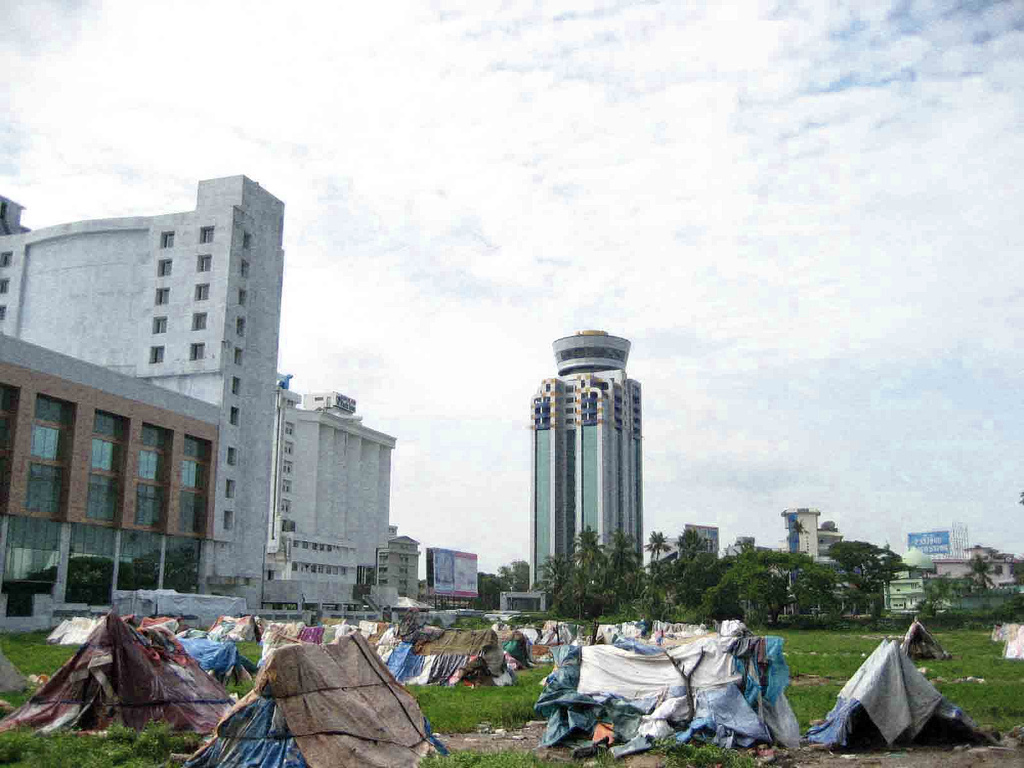When Economics Meets Poetry…
Tuesday, May 10th, 2011 by AnhFrom assessing entries to the Economics Network Student Challenge 2011, we have found out that economists are very talented people. They create music, write poems and draw cartoons. More importantly, they can use the power of words to address the most worrying problems in the world, such as hunger and poverty. This is what our runner-up Anu Omotunde-Young (Lancaster University) did this year. Below is her poem about her home country Nigeria with explanation of why studying Economics can help solve all problems there.
WHY STUDY ECONOMICS AT UNIVERSITY?
Her wrinkled, tired face turned to me:
No Roads; No Light
Where is the light at the end of the road?
No Income; No Food
Who am I to want food when my family starves from having no income?
No Hospitals; No Safety
When will it be safe enough to survive in our hospitals?
No Water; No Strength
Do I not need strength to lug water home from the town well?
No Education; No Future
What will the future of my offspring be when I leave them with no basic education?
No Leadership; No Inspiration
How can my children be inspired with no one to genuinely lead?
No Home; No Consideration
Why should I consider the consequences of my actions when I was left with no home?
How can you care? What can you do?
You are only one out of a 150 million others.
I can start by caring enough to want change,
I can start by admitting we have a major problem,
I can start by learning the accumulation and maintenance of wealth.
Mother!
For you, I learn about sustainable development.
For you, I learn the difference between money and wealth.
For you, I learn how I can generate income and growth using our very own resources.
For you, I learn the components needed for a free market,
For you, I learn about Public Goods and can tell you that you deserve access to healthcare, education, water and shelter.
For you, I stay up all night reading and applying the mechanisms that help boost Investment and Savings.
With this, I propose economic growth that will take you a step further towards that essential job you want.
For us, I do a degree that gives me the skill and passion to make our motherland prosperous.
For us, I work towards being the change we need
In a country filled with abundant natural, human, physical and mental resources such as Nigeria, extreme poverty still outweighs the abundance of wealth. Poverty as mentioned does not occur mainly from the lack of resources but from the unequal share of wealth amongst citizens of a proud nation like Nigeria. The wrinkled, tired woman mentioned in the poem represents the average mother in Nigeria who has no choice but to be strong and extremely hardworking to put food on the table and keep a roof over her family’s heads. Nigeria is the 5th largest oil-producing country in the world and yet over 50% of its inhabitants lack basic water supply, affordable and efficient health services, roads, education and many other basic goods. Nigeria’s economic failure to develop is primarily attributed to its domestic market imperfections, economic inefficiencies, and social rigidities. Political corruption, a parasite social and bureaucratic structure, and the failure to make appropriate Investment in education, agriculture and other prerequisites for economic development restrain the nation.
As a Nigerian student lucky to be born in an averagely comfortable home, I was only made aware of the seriousness of Nigeria’s economic imperfections when as a teen my Father took me to a less developed area in the business capital city of Lagos [areas normally termed the Ghetto] called Ajegunle, and was shocked at the living conditions imposed on the less privileged. This made me aware that life was not all rosy and thus from that moment on, I made a pledge to myself and my fellow countrymen- to do my bit as a citizen of the country to help fully develop the country to a favourable standard. At this time, I was just about to enrol into the upper Secondary School level where I had made plans to take subjects that were intended for a career in creative writing or journalism, however after that experience, I started to read on politics and economics and thus found I had a higher interest in these topics; this made me take these subjects at school and ever since it has been my focus of study till now, and will definitely be for the next few years. The first half of the poem in literary terms depicts the thoughts and fears experienced by the average Nigerian parent on the future of their offspring; the second part is a form of revelation that shows that change can come from the littlest of things, meaning change happens not by thoughts alone but by actions; the third part of the poem substantiates this and shows how in my own way, I am working towards making that change.

